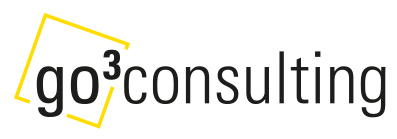Dear all,
over the past few weeks I have touched on a number of aspects of Product Management, but never defined the subject as such.
This is not because I am shying away from this rapidly evolving field (as some of you are aware I have built and run sizeable – peaking with > $ 3B annual revenue – product organizations and product P & Ls before moving into consulting).
On the contrary. With Product Management becoming ever more strategic while at the same time expanding also into corporate-internal IT territories, I wanted to take the time to cover it in more detail.
At the risk of tldr: what is a Product, what is Product Management, and what actually is the role of a Product Manager?
Let’s start with some „working definitions“ (as used here at go3consulting):
A Product is a combination of goods and services that fulfill understood stakeholder needs. Products are purposefully and deliberately created, applying a defined process. They have a specified set of tangible and intangible attributes. Products are usually ‚packaged‘ somehow and created with the intention to derive profits or other business benefits from them.
Product Management is the cross-functional leadership function that ensures the success of the products that an organization relies upon to be able to conduct its business and prosper.
Product success entails balancing a positive user experience when catering to the user’s needs with safeguarding technological feasibility while driving business viability.
Product Management, therefore, is a highly cross functional and strategic function that consists of several roles. These roles may, depending on company size and setup, converge into one or more positions, potentially even in different departments. The following attempts at definitions are therefore highly generalized and must be adapted to circumstances at hand:
The Product Manager’s role is to deliver measurable business results through translating stakeholder needs and company strategies into a product vision, objectives, and strategic initiatives that yield products meeting both stakeholder needs and company objectives.
The Product Owner’s role is to deliver shippable product increments in a regular cadence by translating product vision, understood stakeholder needs, and business constraints into inspiring product goals and prioritized requirements that motivate development teams to deliver maximum business value.
(Historically the two have been and often still are one position. The moniker „Product Owner“ to my mind is more of a function of Agile at its inception wanting to differentiate from „classical“ „spec & run“ approaches plus Agile being rooted more in “IT project” work than in „product“ development. Roman Pichler weighs in on some aspects of the dichotomy here.)
Product Operations‘ role is to provide relevant information to Product Management by developing and managing the tools and processes that facilitate data-driven product decisions. This may include market research, data-driven discovery processes (e.g. prototypes and experiments), and customer- and business impact data and -information.
Last but not least there is a Product Marketing role, responsible for conveying a product’s value to the buyer. This typically entails supporting marketing and sales with product positioning, presentations to prospects, etc.
With all that, Product Management is a complex and proactive business management function, exemplified also by the fact that it is one of the largest job categories for MBA graduates.
All of the above barely scratches the surface of ongoing developments in the field. Therefore, as usual, I would like to suggest some introductory reads:
Product Management – Start Here
The starting point into a series of awesome posts by star PM consultant and bestselling author Marty Cagan
The Ultimate Guide to Product Management
Provided by roadmapping software ProductPlan’s staff. Covers everything from strategy to skills required.
Introduction to Product Management
By Brian de Haaff’s Aha! Features loads of links into more detailed aspects of PM.
For everyone signing out for the year now: I wish you happy, healthy, and safe holidays and a great start into a better 2021!
For everyone else, I will suggest a few long reads for the holiday season next week.
All the best,
Godehard

